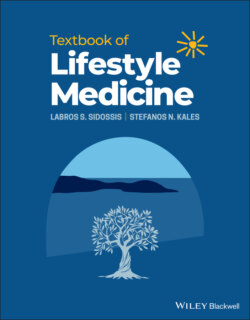Читать книгу Textbook of Lifestyle Medicine - Labros S. Sidossis - Страница 47
Trans Fatty Acids
ОглавлениеTFAs are present in foods such as meat and dairy products from ruminant animals (i.e., cattle, sheep, goats, and camels). However, more TFAs are generated during the manufacturing process of partially hydrogenated vegetable and marine oils, such as margarines, confectionary fats, and fat spreads. Foods that commonly contain margarine (such as deep‐fried foods, baked goods, and snacks) are therefore high in TFAs. Compared to animal fats, hydrogenated vegetable oils are more stable and less likely to become rancid during repeated deep‐frying processes and have greater stability at room temperature. Thus, they are widely used for commercial purposes.
However, TFA intake has been positively and robustly associated with increased risk of CHD and related mortality. The Zutphen Elderly Study showed a positive correlation between intake of TFAs and 10‐year risk for CHD. It was shown that for every 2% increase in TFA‐derived energy at baseline, there was 28% greater risk to develop CHD within the next decade. In the NHS, the 20‐year CHD risk for the women with high trans‐fat intake was associated with 1.3‐fold, i.e. 130% greater risk, compared to their counterparts with the lowest TFA intake, particularly the younger women.
The underlying mechanism by which TFAs increase CVD risk is probably related to changes in lipoprotein profile. Even moderate levels of TFA intake may lead to increased LDL concentrations, while high‐density lipoprotein (HDL) concentrations usually decrease. A meta‐analysis of RCTs exploring the impact of either naturally occurring or industrially produced TFAs on plasma LDL to HDL ratio revealed that, independently of their source, all TFAs can lead to an increase in the LDL to HDL ratio. However, others have challenged these findings; they suggested that the high variability in types of oils and interventions used in the various studies precludes drawing safe conclusions on the effect of specific types of TFAs on lipoproteins levels and CHD risk (i.e., naturally occurring or industrially produced TFAs). Indeed, a systematic review and meta‐analysis of prospective studies found that industrially produced but not naturally occurring TFAs are associated with increased risk of CHD.
Interestingly, growing evidence supports the notion that specific animal‐derived TFAs not only do not have detrimental health effects but may also be beneficial for human health. The naturally occurring trans‐palmitoleic acid, mainly found in whole‐fat dairy products, was associated with reduced CHD mortality, while no association was found with the industrially produced TFAs in a 10‐year study by Kleber and co‐workers. Finally, in a 2016 systematic review and meta‐analysis authorized by the WHO, it was found that the replacement of total or industrial TFAs with either monounsaturated fatty acids (MUFAs) or PUFAs results in improvements in the lipid and lipoprotein profiles, which further lead to the reduction of CVD risk.
